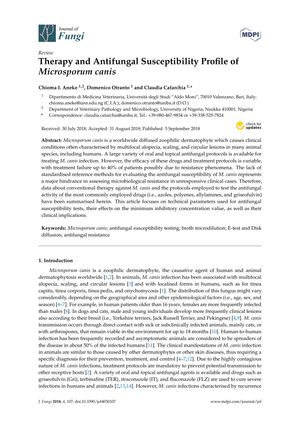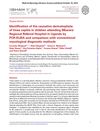Therapy and Antifungal Susceptibility Profile of Microsporum Canis
September 2018
in “
Journal of Fungi
”

TLDR Terbinafine and itraconazole are more effective against Microsporum canis than fluconazole and griseofulvin.
The document reviewed the antifungal susceptibility profiles and treatment efficacy for Microsporum canis, a dermatophyte causing alopecia and skin lesions in humans and animals. It found that fluconazole and griseofulvin were less effective due to high resistance, while terbinafine and itraconazole showed better activity. The study emphasized the need for standardized susceptibility testing methods to improve treatment outcomes and suggested that modified CLSI microdilution methods could serve as future reference standards. The variability in testing results underscored the importance of consistent protocols to better correlate MIC values with clinical efficacy.





